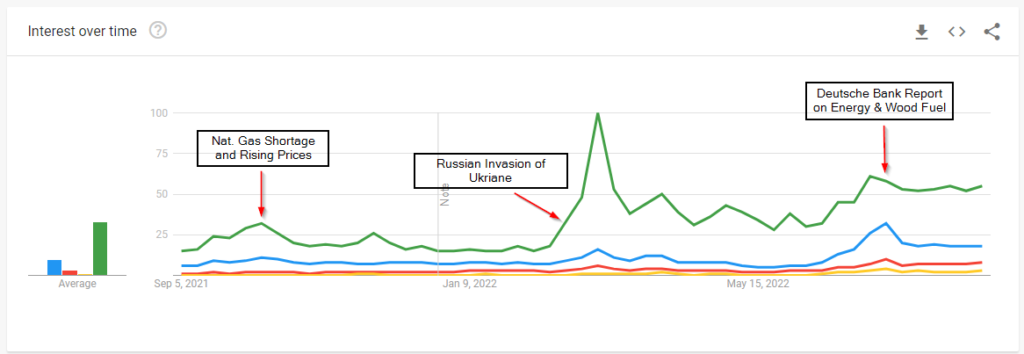On July 13, reports spread of a Deutsche Bank communication regarding Europe’s energy crisis. Natural gas prices are soaring, and in it’s report, Deutsche Bank noted: “In addition, substitution of gas by other energy sources (hard coal and lignite in the power sector, wood for heating purposes in private households where possible, switch to oil derivatives in the industry, etc.) contributes to lower gas demand.”
The public latched on to that line about “wood for heating.” Headlines worldwide, like this one from Market Insider, proclaimed that Germans would be switching to wood for the winter.
“Crisis-Driven Buying & Speculation”
Reports like this set off a spike in searches for firewood-related queries in Germany.
The keywords here are firewood, wood pellets, and brown coal briquettes – fuel for home stoves. Searches for woodstoves also spiked during the week of the report:
According to a report by Deutsche Welle a week following the news story, there is indeed a run on wood heating products in Germany. Wood pellet manufacturers are having difficulty keeping up with the surge. Demand for chimney sweeps has increased by as much as 40%. Citizens are replacing gas appliances with wood stoves.
Customers are telling stove builder Günter Meurer that they don’t want to freeze in the winter. Demand for wood-burning stoves has doubled compared to last year and Meurer is struggling to keep up…The delivery times of some manufacturers already stretch into next summer.
Deutsche Welle
Like the American toilet paper crisis at the outset of the Covid-19 Pandemic, this illustrates how big stories in the media can lead to a near instantaneous tsunami of demand that has severe impacts on businesses in the affected industry.
Wood products aren’t the only type of fuel that has seen a surge both in search traffic, demand, and price. Heating oil is a more common alternative to natural gas used for heating in Germany. Here’s what that search demand looks like:
One oil refinery in Germany noted that it’s experiencing a run on diesel and heating oil. In a statement, the company attributes this to, “crisis-driven market shortages and thus excessive speculation and stockpiling.” (Source)
Search Behavior as a Leading Indicator
Speculation is nothing new, although the immediacy of the internet, social media and the 24-hour news cycle have served to intensify it. However, in this age we have search query data. We have the ability to see what is on people’s minds because they tell us through their Google searches.
Let’s take this current crisis as an example.
Months before the Deutsche Bank report sparked off a firewood frenzy, there had already been an increase in demand for wood fuel and heating oil products. That happened during the week of Russia’s invasion of Ukraine.
Still further back, we see a small elevation related to rising natural gas prices related to a shortage and further interaction with Russia.

There is an opportunity, in my view, to use search behavior with other metrics as a leading indicator of nascent issues. We have data on natural gas prices and search demand for different fuel types. Overlay proxies for energy and political instability. What new understanding could be gained? What predictions could be made?
Google has certainly experimented and enabled this kind of analysis in healthcare. Project Nightingale is a collaboration between Google and Ascension Health using AI to assign treatment plans to patients based on their records.
In Seth Stevens-Davidowitz’s book Everybody Lies, he mentions a study between Microsoft and Columbia University which successfully highlighted the types of queries searched by pancreatic cancer patients pre-diagnosis. The author also did research on how searches for flu symptoms pre-empted upcoming outbreaks.
The Takeaway
I plan on continuing to highlight trends in search queries related to world events. For search professionals, incidents like the German energy crisis and related search trends raises questions like:
- What factors, including search data, can be compared to predict future outcomes?
- How can business, government and other organizations use this data to respond and mitigate negative outcomes?
